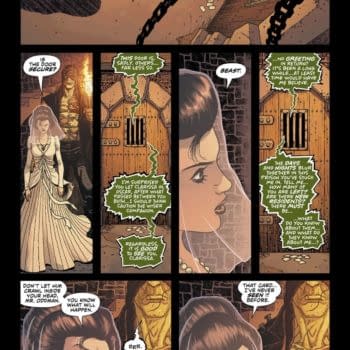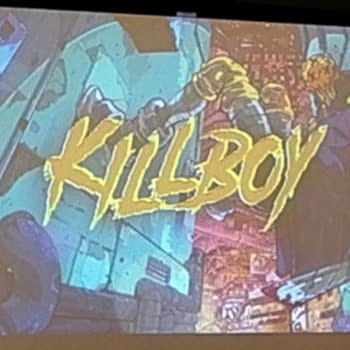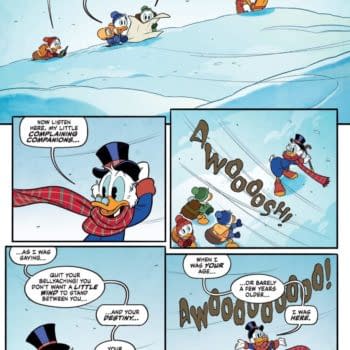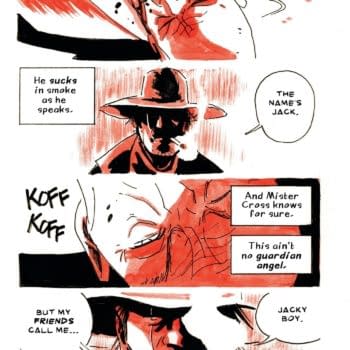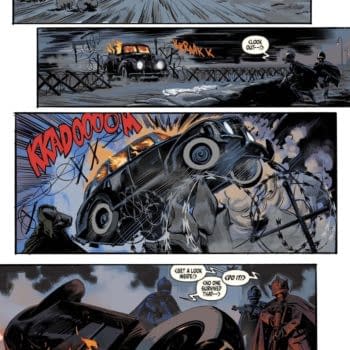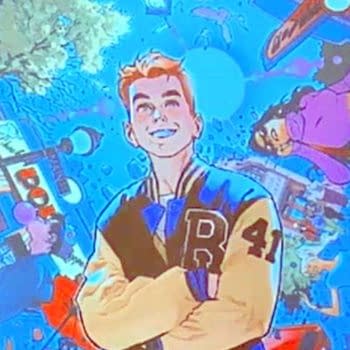Posted in: Comics, Recent Updates | Tagged: 2000ad, Brendan McCarthy, Comics, entertainment, grant morrison, paradax, peter milligan, rebellion, steve yeowell, The New Adventures of Hitler, zenith, Zoids
With New Editions Impending, Was The Hardcover Zenith Worth The Wait?
By Tony Wolf
As a lifelong Grant Morrison fan, I'd long heard whispers of Zenith, the elusive longform, out-of-print postmodern late 80s/early 90s superhero series by Morrison and artist Steve Yeowell (his first collaborator on The Invisibles), originally serialized in the UK weekly anthology 2000AD.
When news broke that Rebellion / 2000AD would be reprinting Zenith for the first time in almost 25 years in a limited edition hardcover, I saw my chance and eagerly signed up for one of the 1,000 copies available. This publication was not without controversy: Morrison had not given his permission for the reprint. Bleeding Cool awaited news of some kind of legal clash of titans but so far, we haven't heard much, beyond Morrison's lawyers sending word of their protest. Still, as a greedy comics reader, I was elated. At last, I would be able to see what all the fuss was about. Divided into four large chapters, known as "Phase I" through "Phase IV," Zenith was still talked about fondly and with respect among fans who read it way back when, as it hit the stands.
The only other glimpse of hope previously offered to those looking to read this legendary series was hundreds of copies of Zenith paperbacks, which were either gathering dust or had been pulped in a warehouse at an undisclosed location in the UK, due to rights and royalties conflicts between Morrison and the publishers.
The other controversy surrounding Zenith comes from veteran comics creator Brendan McCarthy's assertions that Morrison consciously lifted several key elements of the character from McCarthy's earlier series with writer Peter Milligan, Paradax.
Months passed, and my Zenith hardcover arrived in January 2014. I couldn't believe my eyes. Zenith, finally, in my hands! The hardcover edition is a handsome volume by any estimation, with sharp design work. It even includes a short prose story by former Morrison co-writer and current self-hyping Hollywood wonder boy Mark Millar.
With original, creator-owned (well, if the legalities of this reprint get sorted out) characters by Morrison & Yeowell, the story has the benefit of genuine suspense, since this means that even favorite lead and supporting characters – including our hero – may actually die. Morrison manages to, as he has done in all his best work, create a visceral sense of danger and impending doom throughout the tale.
All the hallmarks of a Grant Morrison story are here. Terrifyingly evil fifth-dimensional cosmic entities determined to enslave humanity to their depraved whims, annihilating all creativity and free will? Check. Meta-commentary on then-current trends in superhero comics? Check. Creepy occult notions contrasted with simple everyday joys? Check. Cheeky, irreverent hero who goes from irresponsible, hedonist lout to mature, still-hedonist charming rogue? Check. Forward-thinking notions on social issues? Check. Tendency to show off self-claimed ability to accurately predict trends in society, music and pop culture? Check.
We also see Morrison's poetic language, often used to beautiful effect (demonstrating a kind of evocative, intellectual literary heritage I've only ever also seen in the works of Neil Gaiman and Alan Moore)… remember, Morrison did put the poet Percy Bysshe Shelley himself in early volumes of The Invisibles. We also have a 'multiple earths' construct in Zenith known as 'The Orrery of Worlds,' which concept would later find a home in Morrison's Final Crisis for DC Comics as the 'Multiversal Orrery.'
I believe any comic book fan would find this a very satisfying read. Plus, it serves as a kind of time capsule of cultural concerns and ideas bouncing around the collective consciousness in the early 90s, especially regarding a Britain straining under the political yoke of the Thatcher years. Since the story involves not only Zenith and his 'modern' generation, but the super-people of the 1960s (a group called Cloud 9), we see Morrison's treatment of the hippie 'tune in, turn on' era through a distinctly superpowered lens. A fascinating character called Peter St. John (his superhuman name is "Mandala"), for example, is shown communing with the Beatles during their psychedelic phase. One of the most amusing and unique characters in all of Zenith is Robot Archie (pictured here), who British readers will recognize as a pre-existing character from British boys' adventure comic Lion in the late 60s. Of course, Morrison turns him into something quite different…
Yeowell's art is solid throughout, although clearly the work of a young, up-and-coming and very talented illustrator. As is often the case with early works, we see his art improve dramatically over the course of the volume, and there are no fill-in artists. The only bits that could even be remotely considered 'fill-ins' are a few short one-chapter, stand-alone stories which spotlight supporting characters, drawn by two other artists.
The most devoted Morrisonian scholars will recall that Yeowell also illustrated the Glasgow scribe's controversial The New Adventures of Hitler, which was a kind of David Lynch-esque tone poem or character study of the young aspiring painter and mass murderer; the first hints of his rage just beginning to peek through the cracks. Yeowell also drew Morrison's one toy-related tie-in book, the enigmatic and vaguely Simon Furman-esque ZOIDS. Even in this seemingly chintzy toy comic, produced very early in Morrison's career, the writer's tendency to question the very nature of reality and challenge conventional notions of comic book universes is evident.
The comics press reported several months ago that, buoyed by the healthy sales of the Zenith hardcover, Rebellion / 2000AD were going back to the proverbial well and re-reprinting the whole thing again – but this time separated into four hardcovers (as the ill-fated warehouse run of Zenith was divided). A cash grab? Sounds like it. Bleeding Cool's first review of the limited edition hardcover, by BC contributor Dave Wallace, found here, mentions Rebellion's promise that Zenith would never be reprinted in this format again.
Which this isn't. Still…
Tony Wolf is an actor, voice-over guy, sometime illustrator and rabid pop culture fan in New York City. He can be found lurking about at www.tonywolfactor.com and was the co-host of www.theactionroom.com.


















